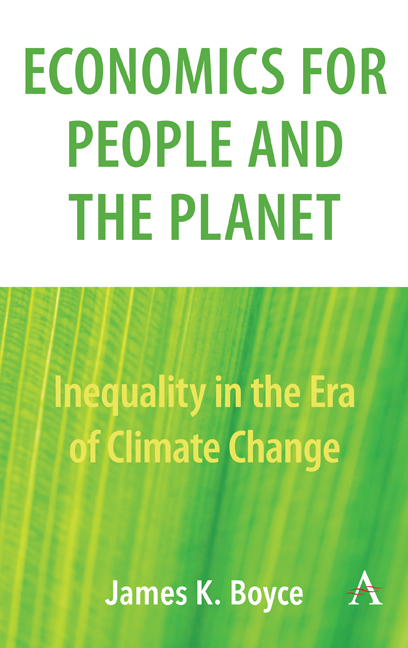Book contents
- Frontmatter
- Contents
- List of Illustrations
- Acknowledgements
- Part I Rethinking Economics and the Environment
- Part II Environmental Injustice
- Part III Climate Policy
- Chapter 17 Smart Climate Policy
- Chapter 18 Investment in Disadvantaged Communities
- Chapter 19 Dividends for All
- Chapter 20 Truth Spill
- Chapter 21 Four Pillars of Climate Justice
- Chapter 22 The Perverse Logic of Offsets
- Chapter 23 Climate Policy as Wealth Creation
- Chapter 24 The Carbon Dividend
- Chapter 25 Keeping the Government Whole
- Chapter 26 Air Quality Co-benefits in Climate Policy
- Chapter 27 Climate Adaptation: Protecting Money or People?
- Chapter 28 Forging a Sustainable Climate Policy
- Notes
- Publication History
- Index
Chapter 24 - The Carbon Dividend
from Part III - Climate Policy
Published online by Cambridge University Press: 12 February 2019
- Frontmatter
- Contents
- List of Illustrations
- Acknowledgements
- Part I Rethinking Economics and the Environment
- Part II Environmental Injustice
- Part III Climate Policy
- Chapter 17 Smart Climate Policy
- Chapter 18 Investment in Disadvantaged Communities
- Chapter 19 Dividends for All
- Chapter 20 Truth Spill
- Chapter 21 Four Pillars of Climate Justice
- Chapter 22 The Perverse Logic of Offsets
- Chapter 23 Climate Policy as Wealth Creation
- Chapter 24 The Carbon Dividend
- Chapter 25 Keeping the Government Whole
- Chapter 26 Air Quality Co-benefits in Climate Policy
- Chapter 27 Climate Adaptation: Protecting Money or People?
- Chapter 28 Forging a Sustainable Climate Policy
- Notes
- Publication History
- Index
Summary
The climate bill proposed in 2014 by Congressman Chris Van Hollen would auction carbon permits and return 100 per cent of the money straight to the American people as equal dividends.
From the scorched earth of climate debates a bold idea is rising–one that just might succeed in breaking the nation's current political impasse on reducing carbon emissions. That's because it would bring tangible gains for American families here and now.
A major obstacle to climate policy in the United States has been the perception that the government is telling us how to live today in the name of those who will live tomorrow. Present-day pain for future gain is never an easy sell. And many Americans have a deep aversion to anything that smells like bigger government.
What if we could find a way to put more money in the pockets of families and less carbon in the atmosphere without expanding government? If the combination sounds too good to be true, read on.
Representative Chris Van Hollen, Democrat of Maryland, introduced legislation that would require coal, oil and natural gas companies to buy a permit for each ton of carbon in the fuels they sell. Permits would be auctioned, and 100 per cent of the proceeds would be returned straight to the American people as equal dividends.
Paying dividends to all isn't rocket science. The state of Alaska has been doing it since 1982. That's when the Alaska Permanent Fund, the brainchild of Governor Jay S. Hammond, a Republican, began to pay dividends from oil royalties based on the principle that the state's natural wealth belongs to all its people. Residents claim their dividends by filling out an online form. Not surprisingly, the Alaska Permanent Fund is permanently popular among Alaskans. From 1982 through 2009, the fund paid out $17.5 billion. The biggest payout, by the way, came under Governor Sarah Palin.
The main difference between Alaska's fund and the one Mr Van Hollen has proposed is that instead of creating an incentive to pump more oil, his legislation creates an incentive to burn less oil and other carbon-based fuels.
The number of permits initially would be capped at the level of our 2005 carbon dioxide emissions. This cap would gradually ratchet down to 80 per cent below that level by 2050.
- Type
- Chapter
- Information
- Economics for People and the PlanetInequality in the Era of Climate Change, pp. 115 - 116Publisher: Anthem PressPrint publication year: 2019



